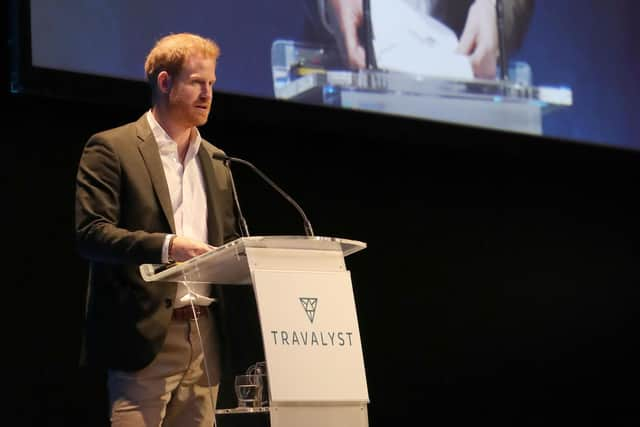Prince Harry in Edinburgh: Some of the world's most beautiful destinations face destruction from overtourism


The Duke of Sussex, who insisted he should simply be referred to as “Harry” at the event, described Scotland as “one of the fastest growing destinations in the world” at the event, one of his last official royal engagements.
Prince Harry used the event to set out his ambitions for a new sustainable tourism initiative he has created to “lead and mobilise” the industry worldwide and will be “a catalyst for positive change” in areas affected by tourism.
Advertisement
Hide AdAdvertisement
Hide AdThe Duke joined forces last autumn with Booking.com, SkyScanner, CTrip, TripAdvisor and Visa to forge a partnership to encourage travellers to make “environmentally friendly choices.”


Speaking at the EICC, the prince called for a collective effort to persuade people to take holidays that bring “social, environmental and economic benefits” to communities and destinations.
The number of overnight stays has soared in Edinburgh by almost a third in the space of seven years, to 4.26 million.
The city was chosen to host the summit less than a year after being named one of the world’s worst overtourism hotspots, along with Rome, Venice and Barcelona.
Advertisement
Hide AdAdvertisement
Hide AdThe Duke said: “Travalyst is a coalition of partners with a shared goal to transform the future of tourism and travel for everyone, to give people access to better information, and ensure the future development of tourism positively supports the destinations that the industry relies on and that their communities depend on.
“We believe travel is a good thing. It’s the heart of human experience, of cultural connections and of new friendship. It’s a global powerhouse that employs hundreds of millions of people, keeping culture alive, protecting some of the world’s most precious spaces and introduces us to people, places and wildlife we’ve only seen on a screen.
“As most of you in this room will know, tourism is one of the world’s largest economic sectors, generating nearly nine trillion dolllars each year, representing one in 10 jobs and more than 10 per cent of the world’s GDP - and it is rapidly growing. It is predicted that tourism will reach more than 1.8 billion travellers by 2030.
“If we don’t act and in large part get ahead of this inevitable surge, this massive increase will mean we see more of the world’s most beautiful destinations closed or destroyed, more communities becoming overwhelmed, more beaches shut because of pollution, and animals and wildlife driven from their natural habitat, which has a huge impact on communities and reduces tourism opportunities.
Advertisement
Hide AdAdvertisement
Hide Ad“We’re here to find ways to make sure that does not happen. We want a future where people are able to take holidays and trips that have social, environmental and economic benefits to communities and destinations built in.
“Based on our research, there is an increasing desire for these type of trips. We want to make them a reality for everyone. But we can’t do it without your help."
Key aims of Travalyst, which was launched last September, include “supporting local people, protecting wildlife, tackling climate change and environmental damage, and alleviating overtourism.
His “coalition” has suggested a worldwide “scoring system” be introduced to highlight eco-friendly airlines, hotels and experiences.
Advertisement
Hide AdAdvertisement
Hide AdPrince Harry added: “I want to create a platform where all of us who are concerned about these issues can work together, where competitors can unite and incentivise in positive systemic change.
"Travalyst’s founding partners have joined forces to lead and mobilise the tourism industry and will be a catalyst for positive change.
“We want to hear truths and perspectives from across the industry.”
VisitScotland, the national tourism agency, joined forces with the EICC to host the summit for Travalyst.
Advertisement
Hide AdAdvertisement
Hide AdPrince Harry added: “We have to work together, with partners, experts, operators, communities and others to scale up the good practices that are in use around the world.
“Scotland is a great example of what we mean. There is a holistic ambition to Scotland’s intent that can be adopted across the UK and even around the world.
“Scotland is one of the fastest growing tourism destinations worldwide and is also at the forefront of having a more sustainable approach, which is why your insight into these issues is so invaluable.”
Speaking at the summit, VisitScotland chairman Lord Thurso said: “Tourism is really big business in Scotland.
Advertisement
Hide AdAdvertisement
Hide Ad“It makes up nine per cent of all businesses, it is worth £11 billion to the economy, there are 15.3 million overnight visitors every year, and 217,000 people are employed in the industry. It’s not something that is going to go away.
“You can see in the areas around the North Coast 500 in the Highlands are benefiting from the desire of people in the central belt to come up and spend their money.
“That means that crofters have good lives, rather than just getting by, that means there are village shops and filling stations which might have closed down, but are still open. There is a real benefit, both in social and economic terms, in what tourism does.
“However we obviously do have a problem with climate change and we decided at board level about 18 months ago that sustainable and responsible tourism should be at the centre of our thinking.
Advertisement
Hide AdAdvertisement
Hide Ad“I’m an optimist. I actually believe the glass is half-full. I think we’re at an extraordinary moment where public opinion is translating into political will and technological advances are reaching the point where they can go into commercial production on the other.
“I think we will get to the point where we will be able to sort some of the problems that we have.”